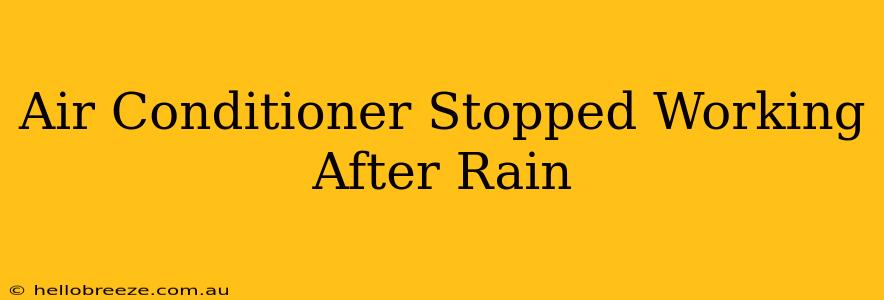Has your air conditioner (AC) conked out after a recent downpour? Don't sweat it (pun intended!). A sudden AC malfunction after rain is a common problem, and often has a straightforward solution. This guide will help you troubleshoot the issue and prevent it from happening again.
Common Causes of AC Failure After Rain
Several factors can cause your AC unit to fail following a rainstorm. Let's explore the most frequent culprits:
1. Electrical Issues:
- Shorted Electrical Components: Rainwater can seep into electrical components, causing short circuits. This is especially true if your outdoor unit isn't properly sealed or if water pools around it.
- Power Surge: Lightning strikes during a storm can send a power surge through your electrical system, damaging sensitive components in your AC unit. This can manifest as a complete shutdown or intermittent problems.
- Tripped Breaker: A sudden surge or short circuit might have tripped a breaker in your electrical panel. Check your panel and reset any tripped breakers.
2. Water Damage:
- Condensation Line Blockage: The condensation line, responsible for draining away water from your AC unit, can become clogged with debris or ice. Rain can exacerbate this issue, leading to water buildup and potential damage.
- Frozen Evaporator Coil: Excessive moisture in the air, combined with a clogged condensation line, can cause the evaporator coil to freeze. This prevents proper airflow and shuts down the system.
- Water Ingress into the Unit: Rain can directly enter your outdoor unit through gaps or cracks in the casing, damaging internal components.
3. Other Potential Problems:
- Refrigerant Leaks: While less directly related to rain, a storm's vibrations might stress weakened connections, potentially causing a refrigerant leak. This will affect cooling performance.
- Faulty Capacitor: A faulty capacitor, a crucial component for starting the compressor, can fail due to electrical issues or age. Rain-related problems can increase the load on it, leading to failure.
- Compressor Issues: The compressor, the heart of your AC system, can be affected by power surges or water damage. A failing compressor will need professional attention.
Troubleshooting Steps
Before calling an HVAC technician, try these basic troubleshooting steps:
- Check the Breaker: Is the breaker to your AC unit tripped? Reset it.
- Examine the Outdoor Unit: Inspect the unit for any visible water damage, loose connections, or debris blocking the airflow.
- Clear the Condensation Line: Locate the drainage line and clear any blockages. You may need a wet/dry vacuum or a drain snake.
- Check for Frozen Coils: If you see ice on the evaporator coil (usually located inside the indoor unit), shut off the system and allow it to thaw before attempting to restart. This may take several hours.
- Inspect Electrical Connections: If you are comfortable working with electricity (and have turned off power to the unit!), carefully inspect the electrical connections for any signs of damage or corrosion.
Warning: If you're not comfortable working with electrical components or refrigerant lines, do not attempt repairs yourself. Contact a qualified HVAC technician.
Preventing Future Problems
- Regular Maintenance: Schedule annual AC maintenance to prevent problems before they arise. A professional cleaning and inspection can identify potential issues early on.
- Proper Drainage: Ensure the area around your outdoor unit is properly graded to allow for adequate drainage and prevent water from pooling.
- Protective Cover: Consider using a protective cover for your outdoor unit during severe storms.
- Seal Gaps and Cracks: Inspect the outdoor unit's casing for any gaps or cracks and seal them with appropriate sealant.
A sudden AC outage after rain can be frustrating, but by understanding the common causes and taking preventative measures, you can minimize the risk and keep your home cool and comfortable. If you're unsure about anything, always call a qualified HVAC technician. They have the expertise to diagnose the problem accurately and perform the necessary repairs safely.

